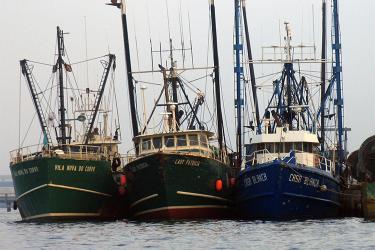NOAA Fisheries and the Gulf of Mexico Fisheries Information Network (GulfFIN) have released GulfFIN’s Regional Implementation Plan. This plan will guide the allocation of agency and partner resources, including funding and research. These resources will address the recreational fishing data needs and priorities over the next several years for Gulf Coast stock assessors and managers.
“This plan was collaboratively developed by those with local expertise and knowledge of the recreational fishing data collection opportunities and challenges along the Gulf Coast, and we are truly appreciative of the hard work our partners put into developing this plan,” said Evan Howell, director of the NOAA Fisheries Office of Science and Technology. “This plan builds upon existing partnership improvement efforts.”
The plan was drafted by GulfFIN with input from:
- Texas, Louisiana, Mississippi, Alabama, and Florida
- Gulf of Mexico Fishery Management Council
- NOAA Fisheries
GulfFIN is a state-federal cooperative program that collects, manages, and disseminates statistical data and information on the marine and estuarine commercial and recreational fisheries of the Southeast region. It is managed by the Gulf States Marine Fisheries Commission, which is one of the three interstate marine fisheries commissions NOAA Fisheries works with on cross-state items related to shared fishery resources.
GulfFIN’s Regional Recreational Fishing Data Priorities at a Glance
- Improved timeliness of recreational catch and effort estimates through evaluating increased Marine Recreational Information Program sampling efforts
- Improved recreational fishery discard data
- Sustained biological data collection to evaluate the age and sex of managed fish stocks
- Streamlining and improving for-hire data collection methods
- Development of an inclusive and transparent process for review of recreational catch and effort estimates and how to handle outliers in the data
- Evaluating additional methods for collecting spatial data, which is essential to determine environmental impacts of leasing large areas for wind energy, fish farms, or other uses
“GulfFIN has always been focused on making improvements to recreational survey programs and finds a great deal of benefit in doing them collaboratively,” said Gregg Bray, Gulf States Marine Fisheries Commission, GulfFIN program coordinator. “We are encouraged to see that several of the Gulf priorities are important in other regions as well.”
Our partners in the Gulf of Mexico are already making strides in addressing several recreational data collection priorities. This includes leveraging $20 million in red snapper Inflation Reduction Act funding. For instance, we are working closely with the Gulf States Marine Fisheries Commission and state partners to:
- Increase accessibility of state fishery-dependent survey data
- Develop and implement Gulf of Mexico video and acoustic camera surveys to improve reef fish data timeliness and generation of density estimates
- Improve estimates of recreational fishing effort and discards; GulfFIN is planning a workshop in 2024 to explore increasing at-sea observer coverage in the Gulf to improve discard data as part of this effort
In addition, we will trial a catch and effort estimate review workshop(s) in 2024 with the Gulf States Marine Fisheries Commission and GulfFIN to strengthen the estimate review process and improve coordination.
“We are excited that funding has already been provided to start working on some of our highest priority needs,” said Bray. “We look forward to making improvements to data collection systems that provide critical information to those making decisions on how to best manage our marine finfish resources.”
NOAA Fisheries uses these regional implementation plans to develop a national inventory of partner needs and associated costs and to inform decision-making for ongoing NOAA Fisheries’ research priorities and budget allocation. These plans are living documents and adjusted by our partners at least every 5 years or as necessary, based on changing science, emerging management needs, and budget availability.
About MRIP
The Marine Recreational Information Program (MRIP) is the state-regional-federal partnership responsible for developing, implementing, and improving surveys that measure how many trips saltwater anglers take and how many fish they catch. Combined with information from commercial, biological, and observer data, this recreational fishing data informs stock assessments and management decisions that
aim to achieve sustainable fisheries for future generations.
Do you have a question about recreational fishing data collection or estimation? Email Sarah Lazo at sarah.lazo@noaa.gov or visit countmyfish.noaa.gov.
Sign Up For Text Message Alerts - Find Out About Immediate Openings and Closures
NOAA's Text Message Alert Program allows you to receive important fishery-related alerts via text message (SMS). Standard message & data rates may apply. You may opt out at any time.
Text alerts you may receive include:
- Immediate fishery openings and closures
- Any significant changes to fishing regulations that happen quickly
Sign up for one or more of the following groups:
- Gulf of Mexico Recreational Fisheries Related Alerts
- Text GULFRECFISH to 888777
- Gulf of Mexico Commercial Fisheries Related Alerts
- Text GULFCOMMFISH to 888777
- South Atlantic Recreational Fisheries Related Alerts
- Text SATLRECFISH to 888777
- South Atlantic Commercial Fisheries Related Alerts
- Text SATLCOMMFISH to 888777
- Caribbean Fisheries-Related Alerts
- Text CARIBFISH to 888777
Quick Glance Contact List for the NOAA Fisheries Southeast Regional Office
Permits Mailbox: The Permits Office in St. Petersburg, Florida, now has a Permits mailbox in the front lobby (263 13th Ave. South, St. Petersburg, FL 33701). You can now drop off original permits for permit transfers. Envelopes with information labels will be provided so that your documents can be attached to the correct application. The mailbox will be checked daily. For more information contact the Permits Office at 877-376-4877.
Other contacts:
Media: Allison Garrett, 727-551-5750
Recreational Fishing Coordinator: Sean Meehan, 727-385-5202


